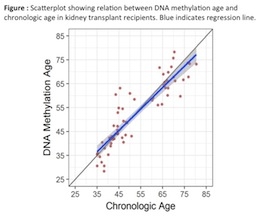DNA Methylation Age and Differential Patterns of DNA Methylation in Older Compared with Younger Kidney Transplant Recipients
David Geffen School of Medicine at UCLA, Los Angeles, CA.
Meeting: 2018 American Transplant Congress
Abstract number: A25
Keywords: Elderly patients, Infection, Kidney transplantation, Lymphocytes
Session Information
Session Name: Poster Session A: Biomarkers, Immune Monitoring and Outcomes
Session Type: Poster Session
Date: Saturday, June 2, 2018
Session Time: 5:30pm-7:30pm
 Presentation Time: 5:30pm-7:30pm
Presentation Time: 5:30pm-7:30pm
Location: Hall 4EF
Introduction: Older transplant recipients experience increased rates of infection and death, but decreased rates of rejection, suggesting a role of immune dysfunction. Analysis of DNA methylation age and patterns of differential DNA methylation have been shown to be superior to chronologic age in prediction of death and age-associated illnesses. We performed a pilot study to determine feasibility of this approach in transplant recipients.
Methods: PBMC were collected 3 mo. after kidney transplantation from 23 older patients (≥60 yrs) and 37 younger patients (30-60 yrs) matched on induction and donor type. DNA methylation analysis was performed by microarray on the Ilumina Infinium Platform. DNA methylation age was calculated using a subset of CpG islands identified as having ability to predict biologic age. We further performed region level differential methylation analysis.
Results: This study represents to our knowledge the first report of DNA methylation analysis in PBMC in transplant recipients. Similar to the non-transplant population, DNA methylation age and chronologic age were highly correlated (Pearson correlation: 0.90; p < 0.001) (Figure). However, many patients demonstrated acceleration or slowing of DNA methylation age compared with chronologic age. Patients with age acceleration demonstrated a trend towards increased incidence of infection in the first year after transplantation (p=0.052 by ANOVA). Region level DNA methylation analysis revealed 111,397 CpG sites differentially methylated in older compared with younger patients. Enrichment analysis revealed genes associated with development, cell-cell signaling, and metabolism. 
Conclusion: We were able to successfully calculate DNA methylation age in transplant recipients. A trend was observed towards DNA methylation age acceleration and infection. Despite receiving similar immunosuppression regimens, older kidney transplant recipients displayed differential DNA methylation compared with younger patients. Analysis of DNA methylation may prove useful for risk stratification of older transplant patients.
CITATION INFORMATION: Schaenman J., Zhou X., Guo R., Rossetti M., Liang E., Abdalla B., Lum E., Bunnapradist S., Danovitch G., Reed E., Elashoff D. DNA Methylation Age and Differential Patterns of DNA Methylation in Older Compared with Younger Kidney Transplant Recipients Am J Transplant. 2017;17 (suppl 3).
To cite this abstract in AMA style:
Schaenman J, Zhou X, Guo R, Rossetti M, Liang E, Abdalla B, Lum E, Bunnapradist S, Danovitch G, Reed E, Elashoff D. DNA Methylation Age and Differential Patterns of DNA Methylation in Older Compared with Younger Kidney Transplant Recipients [abstract]. https://atcmeetingabstracts.com/abstract/dna-methylation-age-and-differential-patterns-of-dna-methylation-in-older-compared-with-younger-kidney-transplant-recipients/. Accessed February 18, 2026.« Back to 2018 American Transplant Congress
